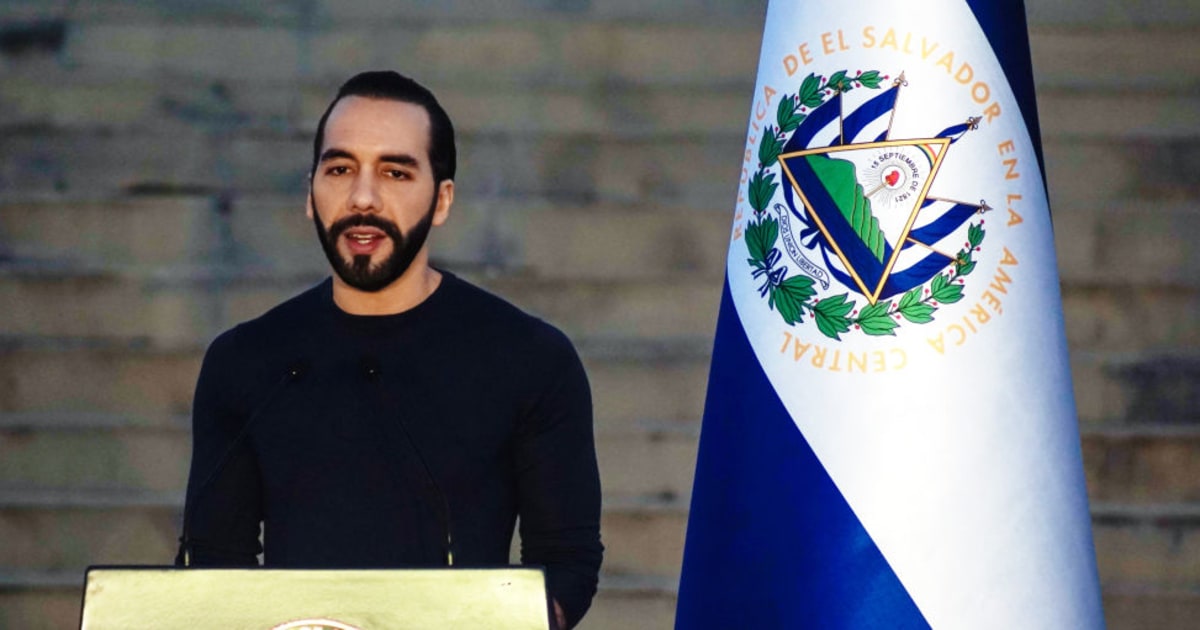Note to readers: EL PAÍS offers openly all the content of the Future Planet section for its daily and global contribution to the 2030 Agenda. If you want to support our journalism,
subscribe here.
The year 2020 ended with a bittersweet taste for those who work to eradicate malaria: infections and deaths were reduced in the last two decades, but it was also known that the pace to end this infectious disease in 2030, when the established deadline will be met. by the United Nations, it has stalled.
Now, the milestone of a small Central American territory is raising spirits: El Salvador has been certified by the World Health Organization (WHO) as a country free of malaria, that is: Salvadorans have demonstrated, beyond any reasonable doubt , that the chain of autochthonous transmission of the parasite that causes the disease, which kills 400,000 people a year in the world, has been interrupted at the national level for at least the last three years.
“Bravo for them!” Praises Pedro Alonso, Spanish epidemiologist and director of the WHO World Malaria Program by phone.
“El Salvador is a small country that shares borders with endemic countries with a lot of population movement through them and has shown that, if there is an importation of cases, its health and epidemiological surveillance systems can detect and eliminate them quickly. ”, He illustrates.
More information
The pandemic that does not stop: malaria deaths fall to their lowest in 20 years, but not the number of cases
Paraguay, the first country in the Americas free of malaria after Cuba
Argentina and Algeria join the 'club' of 38 countries declared malaria free
The certification of the elimination of malaria in El Salvador is the result of more than 50 years of continuous work by the different governments that the country has had together with the Pan American Health Organization and the Global Fund to Fight Malaria, the tuberculosis and AIDS, a financial body with the aim of ending these three diseases.
Giulia Perrone, regional manager for Latin America and the Caribbean of the Fund, also welcomes the news.
"From the beginning, the different governments of El Salvador recognized that sufficient national funding would be crucial to end malaria, which has been reflected in sustained national budget lines over time," he highlights.
And also, in the midst of a pandemic, as Carlos Chaccour, a doctor and malaria expert at the Barcelona Institute for Global Health (ISGlobal) points out.
“There has been a titanic work from the malaria program and the Ministry of Health.
Everything was done remotely: the presentations, the ministerial meetings ... They have managed to start up the entire operation in the midst of a very high logistical complexity ”.
But, above all, the triumph of El Salvador, one of the most unequal countries in Latin America, with two of its seven million inhabitants living in poverty, has been achieved thanks to the involvement of the population and health personnel, and in specifically from health promoters and volunteer collaborators.
“The country has a network of 2,600 volunteer collaborators, which has allowed it to carry out a strategy based on timely diagnosis and immediate treatment, thus guaranteeing cutting the chain of transmission.
Thanks to them, it has been possible to carry out strict epidemiological surveillance throughout the territory, including workers from neighboring countries ”, Perrone emphasizes.
This great victory comes at a time of widespread stagnation in the global fight to eradicate malaria, a disease caused by parasites of the genus
Plasmodium
that are transmitted to humans by the bite of infected mosquitoes and which, if left untreated, can cause death. .
The conclusions of the latest WHO report, published last November and which analyzes 20 years of progress, indicate that although deaths and infections in 2019 reached an all-time low with 409,000 and 200 million respectively, and that there have also been Averted up to 1,500 million infections and 7.6 million deaths in the last two decades, it is no less true that the percentage of progress against the disease has slowed down.
“We have a very worrying situation because in absolute terms we are not making progress: today we have practically the same annual cases as two decades ago.
In these 20 years we have invested forty billion dollars ”, laments Alonso, who recalls that the most serious situation occurs in sub-Saharan Africa, with 90% of the global burden of the disease.
In the Latin America and Caribbean region, malaria cases fell by 40% (from 1.5 million to 0.9 million) and the mortality rate by 50% between 2000 and 2019
In the world, 38 countries and territories have been freed from malaria, according to the WHO, and another 21 are close to achieving it, calculates the Initiative e2021 of this organization.
In the region of the Americas, El Salvador is the third country to achieve this milestone in recent years, after Argentina achieved it in 2019 and Paraguay in 2018. Seven other countries in this region were certified between 1962 and 1973. In addition , cases were reduced by 40% (from 1.5 million to 0.9 million) and the death rate by 50% between 2000 and 2019, according to the latest WHO World Malaria Report.
"Belize is well positioned to eliminate it, as it has reduced local cases to 99% between 2000 and 2017. Also Costa Rica," highlights Perrone, of the Global Fund.
Keys to the Venezuelan increase
The region's progress in recent years has been affected by the significant increase in the disease in Venezuela, the largest in the world in fact, which has gone from registering 35,500 infections in 2000 to more than 467,000 in 2019, and already adds up to the 53% of all cases in the region, according to WHO.
“Venezuela was a pioneer in the fifties for its elimination program, it was the tropical country where malaria was eradicated from the largest contiguous area of land, some 300,000 kilometers, the equivalent of the size of Germany;
we exported training to other countries in the region for their controls, ”illustrates Chaccour, who recalls his Venezuelan origin during the interview.
"We have gone from being a country that exports quality and knowledge to a country that exports malaria," he says.
The reasons for this decline are various.
Mainly, the decline of the health system, which implies “the lack of access to medicines, but also the weakening of vector control programs (mosquitoes).
"Venezuela has invested a negligible figure in prevention in 2019: we are talking about less than $ 20,000," says Chaccour.
And he also points to the economic crisis as one of the causes, as it has led many Venezuelans to start exploiting illegal gold and diamond mines.
“They are perfect breeding sites for the mosquito and malaria vectors.
These mines in the Amazon, in the south, have led to higher and higher outbreaks ”, warns the expert.
The long-awaited vaccine
Any attempt to control the disease requires better and more modern tools, since parasites are developing resistance to current drugs and the mosquitoes that carry them are also learning to defend themselves against insecticides.
"Between the resistances and that the actions such as the spraying of surfaces and mosquito nets have a half life and now it is time to renew them ... All this is a cluster of circumstances that makes the curve flatten and that we are still dealing with figures that are still very large ”, reflects Javier Gamo, director of the malaria unit of the research center DDW (diseases of the developing world, for its acronym in English) of the pharmaceutical company GlaxoSmithKline.
For Pedro Alonso the fundamental thing is immunization.
"With the mosquito nets we have advanced a lot, like the drugs too ... But we need a vaccine, this has been one of the teachings of the covid-19," he asserts.
It also mentions the pilot tests that are being carried out with the only one that currently exists in three African countries (Kenya, Malawi and Ghana) since 2019 and that have already received 600,000 children.
There are high hopes for it, even though its efficiency, of around 40%, does not make it perfect.
"Given the amount of malaria there is, it can have a huge impact," says Alonso about the benefits that this immunization would have in a population of more than three billion people exposed to being infected by the parasite or the more than 200 million who every year they contract the disease.
We need a vaccine, this has been one of the teachings of the covid-19
Pedro Alonso, director of the WHO World Malaria Program
However, Gamo recalls that actions in the form of a vaccine against parasites are much more difficult than against viruses.
"There are against bacteria, against viruses ... There are even against cancer, but the malaria vaccine is the first against a parasite, that gives you an idea of the complexity to develop one", abounds.
In addition, Gamo recalls that parasites also have variants and, in the same way that it has been seen how the covid-19 strains have complicated the work of the scientific community, the
same happens
with
Plasmodium
.
"Parasites also have high variability, and that makes vaccine development very challenging."
The consensus in the expert community is to join forces with prevention measures, drugs and immunization.
Also increase funding, still insufficient: according to WHO, a total of three billion dollars was allocated in 2019, a figure below the 5.6 billion dollars required in the global strategy against malaria.
"This is the time to call for a massive effort to solve a pandemic that we have been with for five thousand years and which is possibly one of the great murderers in absolute terms of humanity," asks Alonso.
"We need something different and covid-19 is a reminder that infectious diseases are not a thing of the past."
FUTURE PLANET can follow on
,
and
, and subscribe
here
to our 'newsletter'
.




/cloudfront-eu-central-1.images.arcpublishing.com/prisa/AWQDFA55JRFZ7EFY4XGGS3VAVQ.jpeg)




